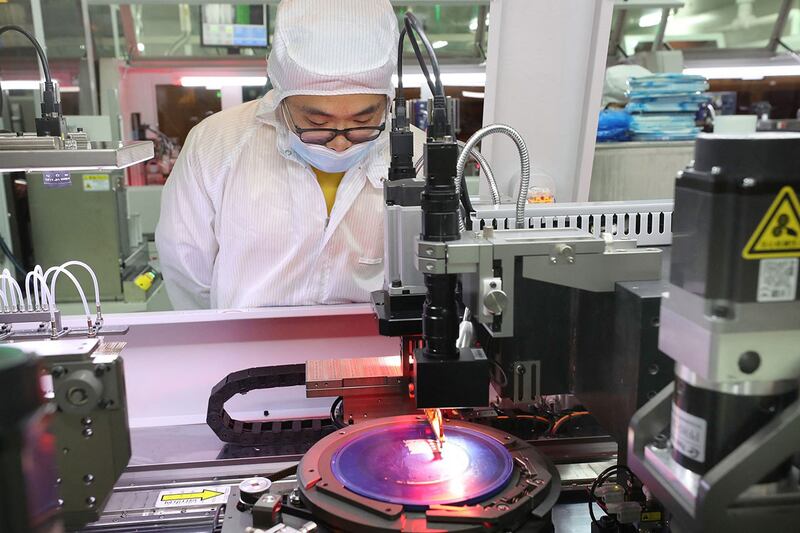As the United States imposes further bans on the export of high-tech software and chips to China, ruling Chinese Communist Party (CCP) leader Xi Jinping has unveiled plans to focus resources on homegrown high-tech products and processes.
Nvidia said on Sept. 2 that it had been banned by the U.S. government from exporting its A100 and H100 graphics processing unit chips to China and Russia, while its DGX AI server was also banned from being shipped to China with the chips onboard.
Reports have also emerged of a U.S. ban on exports of AMD’s MI250 Accelerator AI chip to China.
Currently, Chinese high-end chips can only compete with those made by Nvidia, AMD and Taiwan Semiconductor in a few areas, and the bans are expected to deal a heavy blow to the country's AI sector.
Xi Jinping announced on Sept. 6 a framework of measures aimed at allowing China to "achieve breakthroughs in core technologies and establish competitive advantages and seize the strategic initiative in several important areas," state media reported.
Xi told the 27th meeting of the Central Commission for Comprehensively Deepening Reform that the CCP and government would strengthen leadership of scientific and technological innovation, allocating nationwide resources to meet research and development needs.
The plan envisions the nationwide husbanding of existing resources to achieve "economic and social development in all fields," according to state news agency Xinhua.
Current affairs commentator Wang Qingyang said the reforms proposed by Xi seem to herald a return to a top-down, planned economy, and a sharp turn away from the economic reforms and opening up initiated by late supreme leader Deng Xiaoping.
"The nationalization of science and technology is already under way," Wang told RFA. "For example, there is an annual catalog of official national subsidies for major science and technology projects."
"In the past, they used to distribute funding to some companies, but now it's all under unified state control," he said.
According to Wang, nationalization means that "national interests" are prioritized over everything else, following a similar model to the state-sponsored recruitment and training of elite athletes.
"Imports of high-tech raw materials has pretty much halted under foreign sanctions, so they have to nationalize this system," Wang said. "The biggest precedent for this was the iron and steel smelting during the Great Leap Forward (1958-1960).
Political analyst Xia Liang noted that the Xinhua news agency report on the decision mentioned "reform" seven times, but never once referred to "opening up," suggesting that this part of Deng's policy is being dropped.
"He is taking the initiative to decouple from the entire Western science and technology community," Xia said. "[This means that] over the next two to three years, all foreign software will be replaced by homegrown, Chinese software and hardware."
"Although these domestic products are not so user-friendly, it won't matter, because they make sense for [Xi], whose main concern is security," he said.
"His view of security is all about regime stability," Xia said. "It prepares the public for the next step, which is active decoupling from the West."

Two-way process
The process appears to be a two-way one, as the passage of the CHIPS Act in the United States in July 2022 will strengthen domestic semiconductor manufacturing, design and research, fortify the economy and national security, and reinforce chip supply chains for U.S. companies.
There are also national security concerns around Chinese companies' recent bids to acquire stakes in companies that own certain assets.
Last month, then British secretary of state for business, energy and industrial strategy Kwasi Kwarteng put a stop to the planned acquisition of Bristol-based Pulsic by Super Orange HK Holding Ltd, as its electronic design automation [EDA] products "could be used in a civilian or military supply chain."
In July, Kwarteng made a similar order targeting the would-be acquisition of intellectual property developed by the University of Manchester by the Beijing Infinite Vision Technology Co, which wanted to buy SCAMP-5 and SCAMP-7 vision sensing technology.
China claims it doesn't extend military assistance to Russia, but Chinese customs data showed increased exports of raw materials for military use to Russia.
In the first five months of 2022, Chinese chip shipments to Russia more than doubled from a year earlier to U.S.$50 million, while exports of components like printed circuits also recorded double-digit percentage growth.
China also exported 400 times more alumina -- an important raw material for weapons production and the aerospace industry -- to Russia compared with the same period in 2021.
Translated and edited by Luisetta Mudie.
